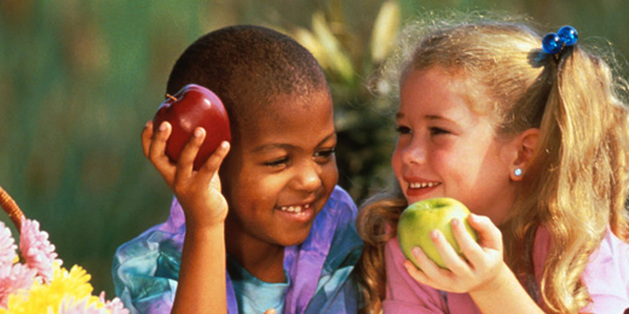 Fred Genesse Concern: Learning two languages in childhood is difficult and can result in delays in language development. Response: Children who have regular and rich exposure to both languages on a daily or weekly basis from parents and other caregivers exhibit the same milestones in language development and at roughly the same ages as monolingual children. It is important to remember that there are large individual differences in children learning to speak—some acquire their first words or use complex utterances much earlier than other children. Delay in the emergence of these milestones does not necessarily mean that there is something wrong; in most cases it simply means that the child has taken longer to reach this stage. The same kinds of differences are characteristic of bilingual children. Concern: Bilingual children have less exposure to each of their languages than monolingual children. As a result, they never master either language fully and, compared to monolingual children, don’t become as proficient. Response: Bilingual children can acquire the same proficiency in all aspects of their two languages over time as monolingual children, even though they usually have less exposure to each language. They acquire the same proficiency in the phonological and grammatical aspects of their two languages as monolingual children do in their one language, provided they are given regular and substantial exposure to each. Bilingual children may have somewhat different patterns of development in certain aspects of language in the short term. Vocabulary is one of those areas. Sometimes, young bilingual children know fewer words in one or both of their languages in comparison with monolingual children of the same age. This is probably because bilingual children must store words from two languages, not just one. As well, because bilingual children learn words in each language from different people, they sometimes know certain words in one language but not in the other. When the vocabulary that bilingual children know in both languages is considered together, they generally know the same number of words and have the same range of vocabulary as their monolingual peers. Most importantly, when and if differences like these occur, they are short term and disappear with time. Generally speaking, bilingual children’s overall proficiency in each language reflects the amount of time they spend in each. Thus, a child who has just returned from a visit to a grandparent where only one of the languages was used, may prefer to use only that language for awhile and, thus, may appear to have lost some proficiency in the other language. This is usually a short term, temporary shift in preference that is corrected once the child is exposed to the neglected language. It is important not to overreact to these temporary fluctuations in proficiency since they are usually temporary. Parents can best ensure that their children achieve full proficiency in both languages by providing rich experiences with each, and especially with the language that might otherwise not get strong support in the extended community. It is important in this regard that parents who do not speak the majority language of the community continue to use their native language, so that they expose their child to varied and rich ways of using language. Concern: Young bilingual children can’t keep their languages separate; they use both at the same time. Response: At some stage, most bilingual children use sounds and words from both languages in the same utterances or conversations, even though the people talking with them are using only one language. Some parents and early childhood educators are concerned when they hear this because they believe that it means that the child is confused and cannot separate the two languages. Research shows that this is not true. The main reason for children mixing their languages in these ways is because they lack sufficient vocabulary in one or both languages to express themselves entirely in each language. Thus, they borrow from the other language. This is an effective communication strategy in most families because parents and other adults who care for bilingual children usually understand both languages and may mix the languages themselves when talking with the child. Research has shown that the most proficient bilinguals mix their languages in the most sophisticated ways without violating the rules of either language. It is normal for children growing up in these communities to mix their languages extensively because they are simply learning the patterns of communication that are common in their community.
0 Comments
 Q: I feel that something is wrong, but my teen won’t tell me what is the matter. I wish I could believe that he is being honest with me. What can I do to encourage him to come to me and tell me his problems? How do I help him know I love him no matter what, and that he can be honest with me? Grow together if you don’t want to grow apart To be gradually closed off and then locked out of someone’s inner life, a child or friend with whom you once enjoyed closeness and communication, can be very painful to endure. Many parents experience this as their children grow and change. There comes a gradual dividing of the ways, a parting. But it doesn’t necessarily have to be a painful parting. Parents and their children can learn to grow together, rather than apart. This takes a great deal of communicating and understanding, plus give and take by the parents and their teens. On their part, parents must continually upgrade their thinking, reevaluate their relationship and try to perceive the new emerging person that their child is becoming. Their child is changing, developing, growing before their eyes. Keeping up with the growth and change in a young person can be very challenging. It is not just a matter of physical changes and hormonal changes, but there are many other deep emotional, mental, social and spiritual changes taking place as well. To keep in step with a teen, parents must constantly be reassessing their relationship and looking for new insight and new ways to relate to him or her, and develop a new set of expectations. To keep up with a changing young person, you have to adapt and change right along with him or her. Adjust your role as they grow Your relationship with your teen can’t remain a parent-child relationship; it has to change to a parent-friend or a friend-to-friend relationship. You must let go of your parent role somewhat if you want to get through to and communicate with your teen. Your young person must feel that you understand him or her as a person. In the eyes of your teens, individuality and independence come to them through breaking out of the parent-child relationships they had with you. They feel they need to break out of this mold in order to grow and become independent, thinking people. Parents who want to keep the parent-child relationships as they are, who want their children to remain subject to them and their ways, will find it increasingly difficult to communicate with their growing, changing “children.” Upgrade your approach and programs The key to keeping up communications is to keep up to date with what is happening in the lives of your children. Be aware of their activities. Pop into their world to see how and what they are doing. Do things with them that they like to do. Be considerate of them. Keep reevaluating and deepening your relationship with them. Keep monitoring yourself as to what you are doing with them and how often you spend time with them. How are you treating them? How are you talking to them? Effective parenting is like a computer program which must be upgraded often to effectively meet changing and more challenging needs. Young people provide these challenges, which always put the “latest versions” to the test! So the parents who want to communicate best with their children must take the time to keep up with their needs. You can’t just remain as you are, where you are. You have to keep upgrading to keep up with them. That’s a lot of work, and it requires an investment on your part. Keep in tune, keep on top of your teens’ situation, and be familiar with what goes on in their lives. If you just don’t know, then stop and take the time to find out. Build a common understanding Sometimes teens’ lack of communication is because something is wrong or because they’re not being honest with you. Often it is not having a lot in common anymore that keeps young people from communicating with their parents. If they think there is little in common, then they think you won’t understand them. There are many ways to build a common understanding. For example, show an interest in the age group your child belongs to. Asking your child to help you understand his or her age group can help lay the groundwork for deeper and more personal communication. Ask sincere questions and let your child explain why things are as they are, why his or her age group feels, acts, or dresses in a certain manner, or whatever. If your teens see your motives for asking as coming from a true desire to understand them, they will feel honored that you recognize them as unique individuals, and that you believe they can help you understand. Often in explaining something to you they come to understand it better themselves. Avoid expressing very strong opinions at these times of building communications. If you feel you must give your opinion, then try to state it as dis-passionately as possible, leaving lots of indications that the door is still open for further discussion. Avoid passing judgment or laying down laws during these times. Just focus on trying to understand your teen and communicate. View your teen as a “person” Seeing you reaching out, trying to understand, and even asking them for help, makes your teens feel more mature, and that they have a special place of importance in your life. They feel good when they see that you view each of them as a “person” and respect each one as someone with insight and understanding, someone who can be called upon for help and counsel. They see you do not think of them as just your children, but more than that—as friends. Showing a young person respect is very important in laying a foundation for communication. When your teens feel you respect them, they feel they can trust you with the more difficult or personal matters or situations they face. Earn their confidence by being confidential Young people gauge how you will likely react to them by how you react to others in a similar situation or with a similar problem. How they see you react tells them if it is safe or not to approach you about something. It tells them what they can do, or at least what they can’t let you find out that they are doing. Young people like to know that what they tell you is said in confidence—that you will not blab it around, or talk about it with others—especially those they do not want told or those they don’t have the same confidence or trust in. If they entrust a bit of personal information about their life with you, they expect you to guard it and keep it in confidence. It is very important to respect their trust in you and not carelessly repeat things they have told you in confidence to others who do not need to know or be involved. It may seem like a small matter to you, but they will not see it that way. When to hold back on getting actively involved When young people do share a difficulty they are going through, parents sometimes want to rush in and take control and help solve it for them. But that is usually not what they want you to do. If you are going to take action on ”their business,” you need to counsel with them first. Tell them what you are thinking and ask their opinion and consent before doing it. Young people often have very definite opinions about what form your involvement and “help” takes, and want it kept within certain boundaries. In most cases, all they are looking for is someone who will listen to them, someone safe to bounce their problems off of: a sounding board. Your role is to be supportive, someone they can talk to and who can help them gauge their course of action. They don’t necessarily want you to become as actively involved as you did when they were children. Your young people may be hesitant to share serious matters with you because they are afraid that you will charge in with the cavalry, and it will be hard for them to stop you, or that they won’t have any control over their situation once they let you know about it. They don’t want you to charge in and embarrass them, or crowd them out of what they feel is their life and their business. Be a nonthreatening force for good in their lives You can still freely express the things you are concerned about. It’s just your timing and presentation that’s important. Sometimes you do need to ask your teens straight out about something you are concerned about, but you should not appear to be suspicious or accusatory. There is a time for asking, “Are you taking drugs?” And there is a time to be less direct and say, “Drugs are out there, and I know you are going to be offered them. Drugs take over and wreck a lot of kids’ lives before they see what’s happening. I hope you will say no, but if something serious does happen, let me know, let me help.” No one likes to be alone when he or she is in trouble, especially a teen. Teens do not want to lose everything they have gained in growing up by getting too much help from their parents. You, as parents, have to be gentle when you try to help them. Seeing how respectful you are of them builds trust and respect for you. They will then see their parents as a nonthreatening force for good in their lives—stable, helpful, dependable friends. Excerpted from "Parenteening" by Derek and Michelle Brookes. © Aurora Productions. Photo by photostock/freedigitalphotos.net
Aaron Crowe Parents teach their children how to read, ride a bike and tie their shoes because they know their kids will rely on these important skills throughout life. For exactly the same reason, they should also teach their children how to be frugal. But parents must be careful how they approach these lessons. Going overboard with frugality can send the wrong message. Think twice before buying cheap raisin bran cereal in bulk and spending hours picking out the raisins -- as one Reddit user did with his son -- simply because it's cheaper than individual boxes of raisins. Doing so probably won't be a cherished childhood memory for your kid. Lecturing your child to be frugal might not be much better. No matter how many times you explain that turning the lights off after leaving a room will lower the electricity bill, it's unlikely to get the job done. "The most important thing is parents need to lead by example," says Dr. Taliba Foster, a child psychiatrist who has a private practice in Ardmore, Pa., a suburb of Philadelphia. "Being frugal is more of a lifestyle, not a lesson. It has to be part of the family lifestyle." Instead of telling your child that saving money is a good habit, show them why and how. Delaying gratification is one way to show kids the benefits of saving money. Take the money you would use buying a toy that your children beg for at the store and save it for a family vacation several months down the road. Parents have many other ways to teach their children about saving money. Here are 10 easy lessons you should try: Set a savings goal. By itself, a savings goal doesn't sound like much of a way to be frugal. But a goal, such as saving for a vacation to Disneyland, can be a way to get kids to see the benefits of saving money for other purposes. Foster, who has an 8-year-old daughter, says she uses this when her daughter wants something at the store. If they decide it's a "want" instead of a "need," Foster will point out that the money would be better saved by the family for a Disneyland vacation. Since children want to please an authority figure during preadolescence, it's a key time to try to teach them smart financial habits, she says. "Right now, they're really ripe for following rules, the difference between right and wrong," Foster says. Get a library card. Going to the library to check out books and DVDs is a habit every family can use to save money. It saves on buying books and renting movies, even though it may take a few weeks on a waiting list to get the latest releases. Kristen Hagopian, a talk-show host in Philadelphia with two children, ages 9 and 6, estimates that a family of four will spend $720 a year if they share a tub of popcorn and two large sodas while watching a movie at the theater once a month. The same family will spend $180 a year, she says, if they buy a $15 DVD each month. Watching movies for free at home is clearly a lot cheaper. No drinks. When you do go out to eat, show your children the price difference when you order water with your meal instead of buying a drink like soda, juice or lemonade. Jamie Ratner, founder of Certifikid.com, a deal site for parents, says she never ordered drinks when she was growing up. Now when she takes her children, ages 4 and 6, out to restaurants they have free water. "We save a fortune on our tabs at meals just by getting water," Ratner says. Price comparison. Showing a child that time is worth money can be difficult, but comparison shopping can help get that message across to them. The more money saved, the less you'll have to work for that money. The less you have to work, the more time you can spend with your family or doing other things you enjoy. "Teaching your child that their time is a currency, just like money, can be very powerful," says Denise Winston of Bakersfield, Calif., who owns the website MoneyStartHere.com. "Taking a few minutes to research a product to find the best price, and if it gets good reviews, translates into money saved that you don't have to earn. This also helps you plan for purchases and teaches delayed gratification." Shop from the low shelves. The grocery store is full of money lessons, and is an excellent place to practice math skills. Sherry Thomas of Boca Raton, Fla., president of Palm Beach Etiquette, a life skills training business, says she used supermarkets to teach her children, now 17 and 19, to find the best bargains on the lower shelves. "The supermarkets make more money if you purchase what costs more," Thomas says. "We tend to buy what is within our sightline. So, if we don't see it, we don't buy it. Thus, the savings are usually lower on shelves that are more difficult to see." She also had her children pick up a 1-pound bag of rice and a 2-pound bag, comparing which would cost less for the long term. Sometimes two 8-ounce cans of a particular food costs less than one 16-ounce can, for example. Stay organized. Leaving piles of things around the house not only leads families to become messy and disorganized, but it can also cost them money. Teaching your children the habit of putting clothes, toys and other items where they belong helps you keep track of your belongings, which saves you money because you don't have to replace them or buy more stuff because you can't find what they already own, says Sarah Mooers, a professional organizer who owns a business called Organized Efficiency in Ambler, Penn. "In one small office, I reorganized their stationery and supplies closet, and their spending on stationery went down dramatically for six months while they worked off the piles of paper and envelopes they didn't even know they had," says Mooers, whose children are 8 and 3. "The same is true in homes -- women who cannot find all their winter shoes when winter rolls around again have to go out and buy new ones." Save a little of everything you earn. It can be as simple as having a family coin jar that everyone drops their change into at the end of the day so they can save for a meal out. Or it can mean taking your child to the bank each week to deposit half of an allowance into his or her savings account. Ozeme Bonnette of Fresno, Calif., has been saving a portion of everything she earns as part of a family lesson her grandfather started by teaching her dad when he was a boy. The savings lesson has helped family members afford buying something on a whim or handle an emergency. Bonnette's daughter, 10, saves 10 percent of her weekly allowance and money she gets at birthdays and Christmas, which has helped her amass hundreds of dollars in savings. Thrift store shopping. Like shopping at a grocery store, shopping for deals at thrift stores, yard sales and flea markets can be frugal lessons that will stick with kids even after they become an adult. Kenyetta Kelley, owner of Luvvy Public Relations, doesn't have children yet, but says she learned as a kid how to find quality, long-lasting items at thrift stores. "I do remember buying children's books as a kid at these places, but I didn't enjoy going back then as much as I do now," says Kelley, who lives in Dothan, Ala. Set an allowance. As soon as children can grasp the concept of an allowance -- for some, this is as young as age 3 or 4 -- it's a good idea to have them to do chores at home so that they learn the responsibilities of being part of a family, says Kim Abraham, a mental health therapist in Flint, Mich., who specializes in treating families and children. Abraham gives her children "responsibilities" not "chores," and they're paid for as much work as they do. If they're not earning money, children can get a sense of entitlement from parents who enjoy the good feeling of giving them something, she says. "The only thing the child is learning is the joy of receiving," Abraham says. The worst case is raising a child who is either too dependent on their parents for everything and never wants to move out of the house, or an independent child who doesn't have empathy and doesn't work well on a team. "What we really, really want is to raise interdependent people" who trust others and work well with them, she says. Earning an allowance with responsibilities at home can help get them there, she says. Don't buy something just because it's on sale. If you don't need something, it's not a bargain. Instead of saving 50 percent when something's on sale, save 100 percent by not buying it at all. It's a lesson that Alina Adams, who writes about being frugal in New York City for Examiner.com, has instilled in her children, ages 14, 10 and 7. "My grandfather used to say, 'When they have a 100 percent sale, call me,'" says Adams, who first encountered the concept of sales and having a choice in what to buy when she emigrated from the Soviet Union to the United States in the 1970s. Her children now accept the lesson. "They've internalized it to a point where, when one says they 'need' something, another will pipe up to say, 'Or do you just want it,'" Adams says. "And then, when we decide the item isn't really necessary, one of them will observe, 'We've saved 100 percent!'" Of all of these frugal lessons, maybe the best is to value time, not just monetarily, but with the time you're able to spend with your children. It's invaluable and spending time with your children teaching them smart money habits, instead of buying them a book or new gadget, is time well spent. Courtesy of Yahoo News
I can’t forget a particularly dreary, rainy Saturday several years ago. The kids had not been able to go outside all day, and they were definitely starting to get on each other’s nerves. I had sidetracked them, separated them, and even secluded them in attempts to maintain some modicum of peace and tranquility. By the time dinner rolled around, everyone was in a lousy mood. The griping and complaining didn’t stop when they came to the table. I turned the radio on and tuned it to an oldies station, trying to liven the mood a little, but even that didn’t seem to help. Then one of the kids had the audacity to make a very disparaging comment about my cooking abilities. The gist of it had to do with the fact that if they had to go to school to learn to read and write, perhaps I should have to go to school to learn to cook. I don’t recall who said it, but I do remember that things grew very tense as everyone waited for my response. For the first few seconds, I was hurt. Then … I started to laugh. “Well, you’re right. I might not be able to cook, but I sure can dance,” I exclaimed, and started jiving to the rock-and-roll song that had just come on the radio. (I am a notoriously lousy dancer!) Soon four little boys were twisting all over the kitchen floor and up on their chairs. Everyone cracked up and we boogied together until the song was over. I promised everyone ice cream if they ate all their broccoli—and my husband promised to do the dishes if I stopped dancing. Somehow the complaints vanished, and we finished our meal. Every last morsel. Joy is something we can learn. It is a decision we can make deep inside our souls—a decision to look at the positive side. The bright side. The crazy side of a situation rather than dwell on the darkness. … I want my children’s memories to verify without a shadow of a doubt that I had a fun time raising them. … I want them to recall with joy all the times I made them smile and all the traditions, games, and memories that we shared together.--Gwendolyn Mitchell Diaz * My good intentions to have tea time alone with my [older] daughters were thwarted [on] the first day. Apparently one of the little children had gotten wind of the plans for a tea party. Of course, they were sure they would be invited for tea. Our tea for three ended up being tea for the whole tribe. It wasn’t quite what I had in mind, but the tea party turned out to be one of those special moments for all of us. Briana showed us how mannerly she could be when she said in her sweetest voice ever, “This tea is delightful. May I please have some more?” Even the boys got in on the act. (They never want to be left out of anything.) There they sat, six little children around the table drinking tea with their pinkies extended. Memories are different than traditions. Although both can be intertwined, traditions are carried on, but memories are carried within. Someday when my children are watching their own children have tea time, I wonder if they will get a far-off look in their eyes as they drift back to memories of pinkies and raspberry leaf tea? Will smiles creep across their faces, as if they have a special secret? That is really what memories are … special secrets. Will they remember the Christmas Mom spent hundreds of dollars on gifts? Or will they only remember the day after Christmas when she made snow angels with them? Will they remember a kitchen full of dirty dishes? Or will they think of all those meals with homemade whole wheat bread every time they smell fresh bread? Will they remember that they had ground beef every Tuesday? Or will they remember the day every meal was blue? I still remember when my mom made green mashed potatoes, and I must have only been two or three.--Terri Camp * There’s a special relationship between a dad and a daughter, something God designed on purpose, I think. It’s not lost on me that of all of the names God could have asked us to call Him, we most often refer to Him as “Father.” I think that’s because He has the same kind of relationship in mind for us that I had in mind for my kids. I think a father’s job, when it’s done best, is to get down on both knees, lean over his children’s lives, and whisper, “Where do you want to go?” Every day God invites us on the same kind of adventure. It’s not a trip where He sends us a rigid itinerary, He simply invites us. God asks what it is He’s made us to love, what it is that captures our attention, what feeds that deep indescribable need of our souls to experience the richness of the world He made. And then, leaning over us, He whispers, “Let’s go do that together.”--Bob Goff * Success as a parent comes through doing your best, giving your all, pouring into your children, and trusting Me for the outcome. The wisdom you have imparted never goes to waste. It doesn’t go down the drain. It doesn’t disappear. It doesn’t ever come to naught. Some things in life are never wasted—things like love, My Word, spiritual input, spiritual training, time spent reaching out to others, and especially time spent pouring into children. By pouring into your children, you’re giving your children things that will never grow old, things that will never fade away—living gifts that will always be a part of their lives, even if they lie dormant for a time. The gifts you give of love, time, training, and truth are permanent parts of your children’s lives that they will never lose.--Jesus, speaking in prophecy * There are going to be times in the day-to-day routine of parenting when you feel overwhelmed by situations and circumstances. The baby’s crying, your eight-year-old won’t do her homework, your teenager’s stereo is shaking the house, your toddler didn’t make it to the potty in time—and your dinner guests will be here any minute! You feel pushed to the brink. Every parent faces days like this. You’re not alone. And you’re not alone in a greater sense: Jesus is right there with you. He understands, and He waits with encouragement and solutions. If you have the opportunity, talking with someone else—maybe your spouse or a friend—can help you see things differently, calm your spirit, and give you a chance to pray together for the Lord’s help. You can even ask your children to pray with you. Their faith and simple prayers, even of your youngest, can be a wonderful encouragement. Whatever you do, don’t give up! Don’t give in to feelings of frustration and discouragement. Shoot up a prayer and ask Jesus to give you power for the hour and grace for the space—and He will. Ask Him to help you see your children as He sees them, to see what they are going to become. He will help you view the situation optimistically and with hope. The outlook may be bleak, but the “uplook” (looking up to Jesus) is always bright. Because children are a reflection of their parents, it’s very easy to get discouraged and feel that you have failed when one or more of your children isn’t doing well in some area. But remember they’re also God’s children, and they are a work in progress—just like you are. “It is God who works in you, both to will and to do for His good pleasure.” All He expects is that you try your best, give them your love, and leave the rest up to Him. Now that doesn’t mean you should just throw up your hands in despair, let “God take care of it,” and quit when the going gets rough. He probably intends for you to be part of His solution. You need to find out from Him what He wants you to do—and do it; then put the rest in His hands and let Him do what you can’t do.--Derek and Michelle Brookes Compilation courtesy of Anchor.
By Shirley Ceasar My young son came into the kitchen this evening while I was preparing dinner, and he handed me a piece of paper he’d been writing on. So, after wiping my hands on my apron, I read it, and this is what it said:
Well, I looked at him standing there expectantly, and a thousand memories flashed through my mind. So, I picked up the paper, and turning it over, this is what I wrote:
When he finished reading, he had great big tears in his eyes. He looked up at me and said, “Mama, I sure do love you.” Then he took the pen and in great big letters he wrote, PAID IN FULL. Photo credit: via photopin. Article courtesy of Motivated magazine.
 By Theresa Leclerc When I was a teenager, I thought I knew it all. I was full of insecurities, but I was also full of opinions—strong ones! Looking back, I feel sorry for my parents. I’m sure I wasn’t an easy child to raise, especially as a teen. I didn’t like the fact that I had stricter parents than some of my friends did, and I pulled away from my mom and dad, as many teens do. I was sure my parents didn’t understand me, and I was right—they didn’t! None of their other kids were anything like me. I questioned everything and had trouble keeping rules. However, although I was tough on the outside, all I really wanted deep down was to find someone who truly understood me. One day I found myself at a gathering where I was the only teenager. While the adults talked in small groups, I sat off in a corner by myself, watching, until a woman named Joy came over and struck up a conversation. Eventually, I opened up and told her about all my troubles. I half expected her to lecture me, but instead she just listened. I could tell that she genuinely cared about getting to know me, and never once did I feel she was putting me in my place or trying to change my opinion; she simply tried to understand me. That conversation was the beginning of a friendship that continued through thick and thin for seven years, until Joy passed away. We would take long walks together and would sometimes write notes to each other about things that were harder to say in person. Even after she moved to a distant city, we kept in touch by phone and mail. For much of those seven years, Joy was so sick that she could have died at any time, but I never heard her complain. She was always bubbly and had a passion for people. Joy taught me something important—that it was okay to be myself. And in the process, she also taught me to try to understand people in a deep way, to look beyond their appearance and sometimes even what they say, to accept them for who they are and show them unconditional love. Though we all seem so different, we’re all made from the same stuff, and we all need love, understanding, and acceptance. When someone sees our need and fills it, we blossom. Article courtesy of Activated! magazine. Photo by photostock via www.freedigitalimages.net
Edwin J. and Alice B. Delattre, book excerpts Our children deserve to learn important lessons from us and to acquire important habits with our help. They need help in learning what matters to us. We want our children to grow up to be responsible adults. We want them to learn to feel, think, and act with respect for themselves and for other people. We want them to pursue their own well-being, while also being considerate of the needs and feelings of others. Many parents will also want to share with their children deeply held religious and moral convictions as a foundation for ethical behavior. This booklet discusses habits of fairness, respect, courage, honesty, and compassion that responsible people share, and it can be used by parents with different beliefs. As parents, we can give our children the best in us by helping them acquire habits and character traits that they can rely on in their own lives. If we help them learn to take pleasure in thinking and behaving well, they will have the best chance to lead good lives as individuals and as citizens in the community. This will be true no matter what unpleasant situations or bad influences they come across. What do we mean by responsibility? None of us is born acting responsibly. A responsible character is formed over time. It is made up of our outlook and daily habits associated with feelings, thoughts, and actions. Responsible people act the way they should whether or not anyone is watching. They do so because they understand that it’s a fight and because they have the courage and self-control to act decently, even when tempted to do otherwise. We want our children to appreciate the importance of being responsible. We also want them to develop the habits and strength to act this way in their everyday lives. Learning to be responsible includes learning to:
Respect and compassion for others As part of being responsible, children need to respect and show concern for the well-being of other people. Respect ranges from using basic manners to having compassion for the suffering of others. Compassion is developed by trying to see things from the point of view of others, and learning that their feelings resemble our own. Respect for others also includes the habit of treating people fairly as individuals, regardless of race, sex, or ethnic group. As we mature, respect includes realizing that not all our obligations to others, such as caring for a family member who is sick, are chosen freely. And it includes tolerance for people who do not share our beliefs or likes or dislikes, as long as they do not harm others. These habits are especially important because many of the wrongs people commit result from indifference to the suffering they cause. Honesty Honesty means telling the truth. It means not misleading others for our own benefit. It also means trying to make decisions, especially important ones, on the basis of evidence rather than prejudice. Honesty includes dealing with other people and being honest with ourselves. To understand the importance of being truthful to others, our children need to learn that living together depends on trust. Without honesty, trusting each other becomes impossible. Honesty with ourselves involves faring up to our own mistakes and biases, even when we have to admit them to others. It includes self-criticism. The point is to learn from our errors and to do our best to correct them, not to dwell on them. Courage Courage is taking a position and doing what is right, even at the risk of some loss. It means being neither reckless nor cowardly, but faring up to our duties. It includes physical courage, intellectual courage to make decisions on the basis of evidence, and moral courage to stand up for our principles. Courage does not mean never being afraid. It can involve trying to overcome our fears, such as a fear of the dark. But our children also need to learn that sometimes it is all right to be afraid. Courage becomes especially important by the time children become teenagers. They often have to stand up against peer pressure to do the wrong thing, such as using drugs. Self-control Self-control is the ability to resist inappropriate behavior in order to act responsibly. It relates to all of the different aspects of responsibility mentioned so far, including respect and compassion for others, honesty, and courage. It involves persistence and sticking to long-term commitments. It also includes dealing effectively with emotions, such as anger, and developing patience. Self-respect People with self-respect take satisfaction in appropriate behavior and hard-won accomplishments. They don’t need to put others down or have a lot of money in order to respect themselves. People who respect themselves also view selfishness, loss of self-control, recklessness, cowardice, and dishonesty as wrong and unworthy of them. As they mature, if they have learned the lessons of responsibility, they will develop a good conscience to guide them. In addition, people who respect themselves respect their own health and safety. Similarly, they are unwilling to be manipulated by others. Patience or tolerance does not mean allowing others to mistreat us. While we help children have high standards for themselves, we also need to let them know that failure is no embarrassment when we have done our best. For example, losing a game when we have played our best, and our opponents have simply played better, is no disgrace. How Can Parents Encourage Responsible Behavior? Everyday experiences Especially when they are young, children learn best about responsibility in concrete situations. What they do and what they witness have lasting effects. Most of the activities described in this book are for you and your child. We are always teaching our children something by our words and actions. They learn from seeing. They learn from hearing. They learn from overhearing. They learn from us, from each other, from other adults, and by themselves. All of us acquire habits by doing things over and over again, whether in learning to play a musical instrument, to pick up after ourselves, to play games and sports, or to share with others. The best way to encourage our children to become responsible is to act as responsibly as we can in their presence. We must genuinely try to be the sort of people we hope they will try to become. We can show them by our words and by our actions that we respect others. We can show them our compassion and concern when others are suffering. They need to see our own self-control, courage, and honesty. They need to learn that we treat ourselves, as well as others, with respect, and that we always try to do our best. As they grow older, they should have the chance to learn why we live as we do. As our children watch us daily, as we talk to them, encouraging their questions and trying to answer them thoughtfully, they begin to understand us—and we begin to understand them. Understanding each other well is the best way to teach our children respect for our ideals of good character. Using literature and stories Children learn about responsibility through many activities, including reading stories. They learn by identifying with individual characters or because the message from a favorite story strikes a particular chord. Children can be touched deeply by good literature, and they may ask to have things read to them again and again. Children can learn all sorts of lessons from stories. They might learn about courage by reading about David standing up to Goliath. Or they might learn the value of persistence and effort from The Little Engine That Could. When they are older, reading can help prepare children for the realities and responsibilities of adulthood. It is usually better for children to read a good book about such things as war, oppression, suicide, or deadly disease before seeing these things up close. Developing Judgment and Thoughtfulness Judgment on ethical issues is a practical matter. Children develop their capacity for judging what is a responsible act, just as they come to appreciate the meaning of responsibility, through practice. Especially when they are young, children need to see moral questions in terms that are meaningful to them. We can also help our children develop good judgment by talking through complicated situations with them. One way is to help them understand the long-term consequences of different choices. If they tell us about a story they have read, we might ask them to imagine what the result might have been if a favorite character had acted differently. Sometimes, it can be difficult to know the difference between acting bravely and acting recklessly or how to balance duties when they conflict. As parents, we can help by making it clear, through what we do as well as what we say, that it is important in such situations to think carefully and honestly about what should be done, as well as to keep in mind how others will be affected by what we do. Your child’s ability to reason about different issues, including ethical ones, will improve as your child matures. Just as reasoning can lead to a more thoughtful understanding of responsibility, or what actions to take in complicated situations, it may also become easier to rationalize selfish or reckless behavior. But if you have helped your young child develop strong habits of considering the welfare of others, honesty, courage, and admiration for worthy accomplishments, your child will have a solid foundation on which to build. Just remember one thing: teaching our children about responsibility doesn’t mean that we can’t laugh or that we have to be grim. Our children should see that we can be serious about our principles, while still being able to play and have fun. Excerpted from Helping Your Child Learn Responsible Behavior. U.S. Department of Education Office of Educational Research and Improvement. 1993
 It’s not easy raising children in today’s world. Many of the godly values that you want to encourage in your children are constantly being attacked by others who are going the opposite direction. You worry that even your best efforts will fail and that your children will turn their backs on the values you hold dear. I know you’re tempted sometimes to give up, but don’t. Your concern and care are not in vain. There’s only so much that you can do, even though you try your best. But I’m capable of doing much more than you ever could, and I am here to help. I also understand your children even better than you do, and I know how to best handle their problems. I want to work with you to shape your children into the godly people you and I both want them to become. Commit your children to Me in prayer. Through prayer you can be the better parent you want to be. Through prayer you can help protect your children from harm and unwholesome influences. Through prayer you can find My solutions to their problems. Through your prayers I can do what you can’t do. Set aside time each day to pray for your children. Each time you’re faced with a troublesome issue, ask Me for the answer. Start today to be a better parent through prayer. Changes that you haven’t thought possible will come to pass through the power of prayer. Courtesy of Activated! magazine.
|
Categories
All
Archives
March 2024
LinksFree Children's Stories |





 RSS Feed
RSS Feed
